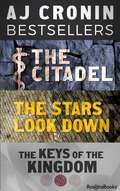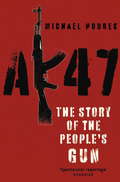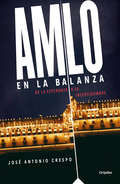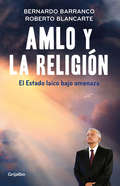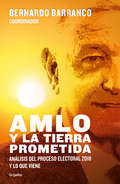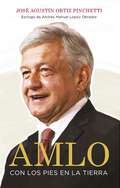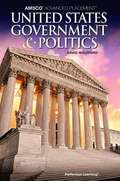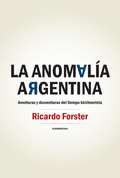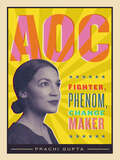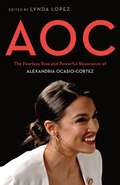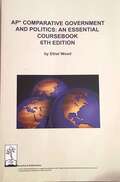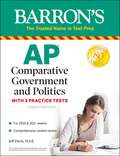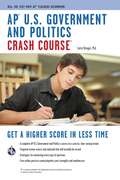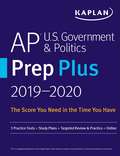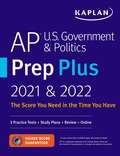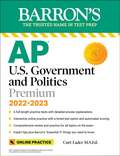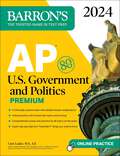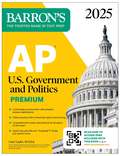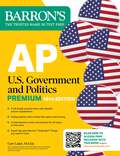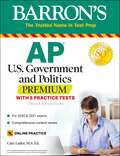- Table View
- List View
AJ Cronin Bestsellers: The Citadel, The Stars Look Down, The Keys of the Kingdom
by AJ CroninThree absorbing classics by the acclaimed Scottish novelist, including a National Book Award winner. This collection includes three novels whose settings range from Wales to China, and which paint a rich portrait of the changes and upheavals of the early decades of the twentieth century:The Citadel: Set in Great Britain in the years between the world wars, this National Book Award-winning novel is &“[a] fine, honest, and moving a study of a young doctor&” (The Atlantic Monthly).The Stars Look Down: This thought-provoking novel follows the challenges faced by a Northern England coal mining community and represents &“the finest work Cronin has given his public&” (Kirkus Reviews).The Keys of the Kingdom: A controversial Scottish Catholic priest embarks on a mission in China, where over years of hardship he learns the true meaning of humanity—and of faith—in &“a magnificent story of the great adventure of individual goodness&” (The New York Times Book Review).
AK47: The Story of the People's Gun
by Michael HodgesIn the sixty years since General Kalashnikov created the AK's distinctive silhouette, the gun has been at the centre of conflicts across the Middle East, Africa and Latin America. The weapon that made him a 'Hero of the Soviet Union' has also appeared on t-shirts and vodka bottles, featured in videos and song lyrics and been re-fashioned in crystal - a gift from Putin to George W. Bush. Power, politics and passion combine in the story of a weapon that has shaped the modern world. Using testimonies of people who have experienced the gun at first-hand - including a Sudanese child soldier, a Vietcong veteran and a Yorkshire teenager - Michael Hodges provides a compelling account of how the AK47 became an icon that ranks alongside Coca-Cola as one of the most recognisable brands in the world.
AK47: The Story of the People's Gun
by Michael HodgesIn the sixty years since General Kalashnikov created the AK's distinctive silhouette, the gun has been at the centre of conflicts across the Middle East, Africa and Latin America. The weapon that made him a 'Hero of the Soviet Union' has also appeared on t-shirts and vodka bottles, featured in videos and song lyrics and been re-fashioned in crystal - a gift from Putin to George W. Bush. Power, politics and passion combine in the story of a weapon that has shaped the modern world. Using testimonies of people who have experienced the gun at first-hand - including a Sudanese child soldier, a Vietcong veteran and a Yorkshire teenager - Michael Hodges provides a compelling account of how the AK47 became an icon that ranks alongside Coca-Cola as one of the most recognisable brands in the world.
AMLO en la balanza: De la esperanza a la incertidumbre
by José Antonio CrespoYa es tiempo de hacer un corte de caja. Hace dos años Andrés Manuel López Obrador estaba por ganar la presidencia de la República gracias a promesas que calaron hondo en 30 millones de votantes. Hoy, tras más de un año de gobierno, ¿qué ha cumplido y qué no? Exactamente, ¿cuáles son sus logros?, ¿en qué se ha desviado del proyecto que lo llevó al triunfo? Con datos irrefutables, José Antonio Crespo reconstruye la historia del actual sexenio. Hace la radiografía de Morena, pinta las políticas más criticadas y las más aplaudidas, explica el neocentralismo, los retos de la aplanadora legislativa, las dudas de los mercados financieros y la rápida trasmutación de la gran esperanza en incertidumbre. A la vista de los datos, ¿qué futuro nos espera?
AMLO y la religión: El estado laico bajo amenaza
by Bernardo Barranco Roberto BlancarteLa Iglesia y el Estado han vuelto a sonreírse. La religión ha recuperado protagonismo en la vida política de México. El responsable de ese fenómeno es el presidente Andrés Manuel López Obrador. Pese a declararse juarista, el primer mandatario ha difuminado, como ninguno de sus predecesores, la frontera entre lo que es de Dios y lo que es del César: llegó al poder aliado con un partido de origen religioso, ha invitado a Palacio Nacional a líderes y agrupaciones cristianas, ha abierto la puerta de las concesiones televisivas a iglesias evangélicas; defiende políticas de Estado con frases bíblicas y ha pedido a las adscripciones religiosas que distribuyan la Cartilla Moral, documento básico para la llamada Cuarta Transformación. En AMLO y la religión, Roberto Blancarte y Bernardo Barranco, los dos mayores expertos en el tema, diseccionan esta dinámica que puede transformar el balance de poder en México, cambiar el rostro del país y redefinir conceptos como laicidad y separación Iglesia-Estado.
AMLO y la tierra prometida: Análisis del proceso electoral 2018 y lo que viene
by Bernardo Barranco¿Será el edén o sobrevendrá un infierno? Las expectativas y las dudas por el gobierno de Andrés Manuel López Obrador se multiplican. Ante esta incertidumbre, once analistas de primera línea ofrecen las explicaciones más informadas y agudas. ¿Qué México recibirá López Obrador? ¿Cómo fueron los comicios que lo llevaron al poder? ¿Qué problemas se padecieron y qué riesgos evidencian? ¿De qué tamaño es la podredumbre del sistema político y qué podemos esperar, por lo tanto? En esta obra, tanto los críticos como los partidarios de AMLO encontrarán los datos precisos y las explicaciones exactas para entender la pasada elección y comprender qué México se nos viene encima. Bernardo Barranco, Coordinador Carmen Aristegui, Prólogo Francisco Abundis · María Amp Aro Casar Juana Inés Dehesa Rogelio Gómez Hermosill O Julio Hernández · D Aniel Moreno Ric Ardo Raphael Ana Saiz · Jenaro Vill Amil
AMLO: Con los pies en la tierra
by José Agustín PinchettiUn libro revelador que desmonta los mitos que se han construido en torno al candidato puntero para las elecciones presidenciales de 2018. El autor del libro es una de las personas que conoce más de cerca a AMLO, por lo que cuenta con información de primera mano. El libro cuenta con un epílogo escrito especialmente para este libro, por el propio López Obrador. Una obra de completa actualidad e impacto mediático garantizado, que será de referencia necesaria en el ambiente político y electoral durante 2018.
AMSCO® Advanced Placement® United States Government and Politics
by David WolffordNIMAC-sourced textbook
ANOMALIA ARGENTINA, LA (EBOOK)
by Ricardo ForsterEstas páginas nacieron de las urgencias y de los reclamos de una realidad siempre en movimiento espasmódico, siempre quebrando lo esperado y abriéndose a inquietantes novedades que suelen conmover lo conocido y lo previamente arraigado en el sentido común. Argentina ha sido, y sigue siendo, una anomalía, el largo zigzagueo de un país extraño que suele desbaratar cualquier anticipación o cualquier prejuicio respecto a su itinerario actual o a los modos en los que se desplegó en el pasado. Territorio de incógnitas y de inquietantes sorpresas que ha esquivado con prolijidad los destinos que aparentemente estaban escritos desde sus orígenes en este margen sureño del continente americano. Desde el inesperado conflicto generado por la disputa en torno de la renta agraria, pasando por el histórico debate sobre una nueva ley de medios #que fisuró el bloque hegemónico de la comunicación, desmontando el relato de la corporación mediática#, hasta la importancia de medidas como la reestatización del sistema jubilatorio, la política de derechos humanos, el impulso latinoamericanista o la asignación universal por hijo, con valentía y agudeza Ricardo Forster revisa en estos textos, escritos ante las demandas de intervención pública y las exigencias del combate cultural, los nudos centrales de la historia política nacional de los últimos años.
AOC: Fighter, Phenom, Changemaker
by Prachi Gupta&“We are going to rock the world.&” — Alexandria Ocasio-Cortez Born in the Bronx and raised in the suburbs of Westchester County, New York, Alexandria Ocasio-Cortez witnessed firsthand how a person&’s zip code can shape their destiny. That early exposure to income inequality fueled a passion for change that, in turn, led her to take on—and defeat—a ten-term incumbent to become the youngest woman ever elected to Congress. Now a target for the right, she is an inspiration to millions of millennial voters, women of color, and progressives. A celebratory biography that tells the blow-by-blow account of AOC&’s extraordinary rise from bartender to political rock star, AOC is a compelling look at Alexandria Ocasio-Cortez: who she is, what she stands for, and the movement that she&’s energized.
AOC: The Fearless Rise and Powerful Resonance of Alexandria Ocasio-Cortez
by Lynda LopezWith a preface by Keegan-Michael Key In the vein of Notorious RBG, seventeen writers explore the multiple meanings of a young Latina politician who has already made history.From the moment Alexandria Ocasio-Cortez beat a ten-term incumbent in the primary election for New York’s 14th, her journey to the national, if not world, stage, was fast-tracked. Six months later, as the youngest Congresswoman ever elected, AOC became one of a handful of Latina politicians in Washington, D.C. Just thirty, she represents her generation, the millennials, in many groundbreaking ways: proudly working class, Democratic Socialist, of Puerto Rican descent, master of social media, not to mention of the Bronx, feminist—and a great dancer.AOC investigates her symbolic and personal significance for so many, from her willingness to use her imperfect bi-lingualism, to why men are so threatened by her power, to the long history of Puerto Rican activism that she joins. Contributors span a wide range of voices and ages, from media to the arts and politics:Keegan-Michael Key — PrefaceLynda Lopez — Introduction: "The Meaning of AOC"Jennine Capó Crucet — "An Open Letter to Congresswoman Ocasio-Cortez"Andrea González-Ramírez — "Women Like Me Aren’t Supposed to Run for Office"Patricia Reynoso — “'The First Latina to . . .'” Pedro Regalado — “'Pa’lante!': The Long History of Puerto Rican Activism in New York City"Rebecca Traister — "The Imagined Threat of a Woman Who Governs Like a Man"Natalia Sylvester — "In No Uncertain Terms"Erin Aubry Kaplan — "The Center Will Not Hold. Alexandria Ocasio-Cortez Is Counting on It"Tracey Ross — "A Just Society"Carmen Rita Wong — "Latinas Are So Money"Mariana Atencio — "AOC the Influencer"Wendy Carrillo — "What AOC and I Learned at Standing Rock"Nathan J. Robinson — "The Democratic Socialism of AOC"Prisca Dorcas Mojica Rodriguez — "On Being an Indignant Brown Girl"Elizabeth Yeampierre — "Making the Green New Deal the Real Deal"María Cristina “MC” González Noguera — "The Hustle"
AP Comparative Government and Politics: An Essential Coursebook
by Ethel WoodWhat is the Coursebook? The Coursebook is more concise (and less expensive) than most AP comparative government textbooks. The Coursebook is more comprehensive than most AP review books and should not be purchased as a last-minute review for the exam. The Coursebook thoroughly covers the topics from the AP curriculum, yet its clear, concise style helps students to see and understand underlying comparative government themes without getting lost in a myriad of facts. This all new 6th edition of Ethel Wood's book is expanded to help students to understand the AP Comparative Government and Politics curriculum. It is fully updated, and includes all new multiple-choice and free-response questions.
AP Comparative Government and Politics: An Essential Coursebook (7th Edition)
by Ethel WoodWhat is the Coursebook? The Coursebook is more concise (and less expensive) than most AP comparative government textbooks. The Coursebook is more comprehensive than most AP review books and should not be purchased as a last-minute review for the exam. The Coursebook thoroughly covers the topics from the AP curriculum, yet its clear, concise style helps students to see and understand underlying comparative government themes without getting lost in a myriad of facts. This all new 7th edition of Ethel Wood's book is expanded to help students to understand the AP Comparative Government and Politics curriculum. It is fully updated, and includes all new multiple-choice and free-response questions.
AP Comparative Government and Politics: With 3 Practice Tests (Barron's Test Prep)
by Jeff Davis M.Ed.Barron&’s AP Comparative Government and Politics is fully revised for the May 2020 exam changes. You&’ll get in-depth review plus practice that reflects the new multiple-choice format and changes to free-response questions.This updated edition features:Two full-length practice tests to help you apply the knowledge you learned in classOne diagnostic test to help you determine which sections you need to focus onIn-depth study of the governments of six nations: Britain, Russia, China, Mexico, Iran, and NigeriaUseful quick country comparison chart and glossaries of important terms
AP U. S. Government And Politics
by Larry S. KriegerREA's Crash Course for the AP* U. S. Government & Politics Exam - Gets You a Higher Advanced Placement* Score in Less Time Crash Course is perfect for the time-crunched student, the last-minute studier, or anyone who wants a refresher on the subject. Are you crunched for time? Have you started studying for your Advanced Placement* U. S. Government & Politics exam yet? How will you memorize everything you need to know before the test? Do you wish there was a fast and easy way to study for the exam AND boost your score? If this sounds like you, don't panic. REA's Crash Course for AP* U. S. Government & Politics is just what you need.
AP U.S. Government & Politics Prep Plus 2019-2020: 3 Practice Tests + Study Plans + Targeted Review & Practice + Online (Kaplan Test Prep)
by Kaplan Test PrepKaplan's AP U.S. Government & Politics 2019-2020 is completely restructured and aligned with the current AP exam, giving you concise review of the most-tested content to quickly build your skills and confidence. With bite-sized, test-like practice sets and customizable study plans, our guide fits your schedule.To access your online resources, go to kaptest.com/moreonline and follow the directions. You'll need your book handy to complete the process.Personalized Prep. Realistic Practice.Three full-length practice exams and an online test scoring tool to convert your raw score into a 1–5 scaled scorePre- and post-quizzes in each chapter so you can monitor your progressCustomizable study plans tailored to your individual goals and prep timeFocused content review on the essential concepts to help you make the most of your study timeOnline quizzes for additional practiceTest-taking strategies designed specifically for AP U.S. Government & PoliticsExpert GuidanceWe know the test—our AP experts make sure our practice questions and study materials are true to the examWe know students—every explanation is written to help you learn, and our tips on the exam structure and question formats will help you avoid surprises on Test DayWe invented test prep—Kaplan (www.kaptest.com) has been helping students for 80 years, and more than 95% of our students get into their top-choice schools
AP U.S. Government & Politics Prep Plus 2021 & 2022: 3 Practice Tests + Study Plans + Targeted Review & Practice + Online (Kaplan Test Prep)
by Kaplan Test PrepKaplan's AP U.S. Government & Politics 2021 & 2022 is revised to align with the 2021 AP exam. This edition features pre-chapter assessments to help you review efficiently, lots of practice questions in the book and even more online, 3 full-length practice tests, complete explanations for every question, and a concise review of the most-tested content to quickly build your skills and confidence. "Rapid" and "Comprehensive" content review sections allow you to choose the amount of prep you need for each topic tested. With bite-sized, test-like practice sets, expert strategies, and customizable study plans, our guide fits your schedule whether you need targeted prep or comprehensive review. We&’re so confident that AP U.S. Government & Politics offers the guidance you need that we guarantee it: After studying with our online resources and book, you&’ll score higher on the exam—or you'll get your money back. The College Board has announced that there are May 2021 test dates available are May 3-7 and May 10-14, 2021. To access your online resources, go to kaptest.com/moreonline and follow the directions. You'll need your book handy to complete the process.Personalized Prep. Realistic Practice. 3 full-length practice exams with comprehensive explanations and an online test scoring tool to convert your raw score into a 1–5 scaled scorePre- and post-quizzes in each chapter so you can monitor your progress and study exactly what you needCustomizable study plans tailored to your individual goals and prep timeOnline quizzes for additional practice ·Focused content review on the essential concepts to help you make the most of your study timeTest-taking strategies designed specifically for AP U.S. Government & PoliticsExpert Guidance We know the test—our AP experts make sure our practice questions and study materials are true to the examWe know students—every explanation is written to help you learn, and our tips on the exam structure and question formats will help you avoid surprises on Test DayWe invented test prep—Kaplan (kaptest.com) has been helping students for 80 years, and more than 95% of our students get into their top-choice schools
AP U.S. Government and Politics Flashcards, Fifth Edition: Up-to-Date Review (Barron's AP Prep)
by Curt Lader M.S. Ed.Be prepared for exam day with Barron&’s.Trusted content from AP experts!Barron&’s AP U.S. Government and Politics Flashcards includes 400 up-to-date content review cardsWritten by Experienced EducatorsLearn from Barron&’s--all content is written and reviewed by AP expertsBuild your understanding with review tailored to the most recent examBe Confident on Exam DayStrengthen your knowledge with in-depth review covering all units on the AP U.S. Government and Politics examFind specific topics quickly and easily with cards organized by unitCheck out Barron&’s AP U.S. Government and Politics Premium for even more review, full-length practice tests, and access to Barron&’s Online Learning Hub for a timed test option and scoring.
AP U.S. Government and Politics Flashcards, Fourth Edition: Up-to-Date Review (Barron's Test Prep)
by Curt Lader M.S. Ed.Be prepared for exam day with Barron&’s. Trusted content from AP experts! Barron&’s AP U.S. Government and Politics Flashcards includes 400 up-to-date content review cards Written by Experienced Educators Learn from Barron&’s--all content is written and reviewed by AP expertsBuild your understanding with review tailored to the most recent exam Be Confident on Exam DayStrengthen your knowledge with in-depth review covering all units on the AP U.S. Government and Politics examFind specific topics quickly and easily with cards organized by unit Customize your review using the enclosed sorting ring to arrange cards in an order that best suits your study needsCheck out Barron&’s AP U.S. Government and Politics Premium for even more review, full-length practice tests, and access to Barron&’s Online Learning Hub for a timed test option and automated scoring.
AP U.S. Government and Politics Premium, 2022-2023: 6 Practice Tests + Comprehensive Review + Online Practice (Barron's Test Prep)
by Curt Lader M.S. Ed.Be prepared for exam day with Barron&’s. Trusted content from AP experts! Barron&’s AP U.S. Government and Politics Premium: 2022-2023 includes in-depth content review and online practice. It&’s the only book you&’ll need to be prepared for exam day.Written by Experienced Educators Learn from Barron&’s--all content is written and reviewed by AP expertsBuild your understanding with comprehensive review tailored to the most recent exam Get a leg up with tips, strategies, and study advice for exam day--it&’s like having a trusted tutor by your sideBe Confident on Exam DaySharpen your test-taking skills with 6 full-length practice tests--3 in the book, including a diagnostic test to target your studying, and 3 more onlineStrengthen your knowledge with in-depth review covering all Units on the AP U.S. Government and Politics ExamReinforce your learning with practice questions at the end of each chapter Online PracticeContinue your practice with 3 full-length practice tests on Barron&’s Online Learning HubSimulate the exam experience with a timed test option Deepen your understanding with detailed answer explanations and expert adviceGain confidence with scoring to check your learning progress
AP U.S. Government and Politics Premium, 2024: 6 Practice Tests + Comprehensive Review + Online Practice (Barron's AP)
by Curt Lader M.S. Ed.Be prepared for exam day with Barron&’s. Trusted content from AP experts!Barron&’s AP U.S. Government and Politics Premium, 2024 includes in-depth content review and online practice. It&’s the only book you&’ll need to be prepared for exam day.Written by Experienced Educators Learn from Barron&’s--all content is written and reviewed by AP expertsBuild your understanding with comprehensive review tailored to the most recent exam Get a leg up with tips, strategies, and study advice for exam day--it&’s like having a trusted tutor by your sideBe Confident on Exam DaySharpen your test-taking skills with 6 full-length practice tests--3 in the book, including a diagnostic test to target your studying, and 3 more onlineStrengthen your knowledge with in-depth review covering all Units on the AP U.S. Government and Politics ExamReinforce your learning with practice questions at the end of each chapter Online PracticeContinue your practice with 3 full-length practice tests on Barron&’s Online Learning HubSimulate the exam experience with a timed test option Deepen your understanding with detailed answer explanations.Gain confidence with scoring to check your learning progress
AP U.S. Government and Politics Premium, 2025: Prep Book With 6 Practice Tests + Comprehensive Review + Online Practice (Barron's AP Prep)
by Curt Lader M.S. Ed.Be prepared for exam day with Barron&’s. Trusted content from AP experts!Barron&’s AP U.S. Government and Politics Premium, 2025 includes in‑depth content review and online practice. It&’s the only book you&’ll need to be prepared for exam day.Written by Experienced EducatorsLearn from Barron&’s‑‑all content is written and reviewed by AP expertsBuild your understanding with comprehensive review tailored to the most recent examGet a leg up with tips, strategies, and study advice for exam day‑‑it&’s like having a trusted tutor by your sideBe Confident on Exam DaySharpen your test‑taking skills with 6 full‑length practice tests‑‑3 in the book, including a diagnostic test to target your studying, and 3 more online–plus detailed answer explanations and scoring rubrics for all questionsStrengthen your knowledge with in‑depth review covering all Units on the AP U.S. Government and Politics ExamReinforce your learning with multiple-choice and free-response practice questions at the end of each chapterBecome familiar with all of the required foundational documents and Supreme Court cases you need to know for test day, all clearly noted throughout the bookOnline PracticeContinue your practice with 3 full‑length practice tests on Barron&’s Online Learning HubSimulate the exam experience with a timed test optionDeepen your understanding with detailed answer explanations and expert adviceGain confidence with scoring to check your learning progress
AP U.S. Government and Politics Premium, Sixteenth Edition: Prep Book with 6 Practice Tests + Comprehensive Review + Online Practice (Barron's AP Prep)
by Curt Lader M.S. Ed. Barron's Educational SeriesBe prepared for exam day with Barron&’s. Trusted content from AP experts! Barron&’s AP U.S. Government and Politics Premium, Sixteenth Edition includes in‑depth content review and online practice. It&’s the only book you&’ll need to be prepared for exam day. Written by Experienced Educators Learn from Barron&’s‑‑all content is written and reviewed by AP experts Build your understanding with comprehensive review tailored to the most recent exam Get a leg up with tips, strategies, and study advice for exam day‑‑it&’s like having a trusted tutor by your side Be Confident on Exam Day Sharpen your test‑taking skills with 6 full‑length practice tests‑‑3 in the book, including a diagnostic test to target your studying, and 3 more online–plus detailed answer explanations and scoring rubrics for all questions Strengthen your knowledge with in‑depth review covering all Units on the AP U.S. Government and Politics Exam Reinforce your learning with multiple-choice and free-response practice questions at the end of each chapter Become familiar with all of the required foundational documents and Supreme Court cases you need to know for test day, all clearly noted throughout the book Online Practice Continue your practice with 3 full‑length practice tests on Barron&’s Online Learning Hub Simulate the exam experience with a timed test option Deepen your understanding with detailed answer explanations and expert advice Gain confidence with scoring to check your learning progress Publisher's Note: Products purchased from 3rd party sellers are not guaranteed by the publisher for quality, authenticity, or access to any online entities included with the product.
AP US Government and Politics Premium: With 5 Practice Tests (Barron's Test Prep)
by Curt Lader M.S. Ed.Barron&’s AP U.S. Government and Politics Premium is aligned with the College Board course and updated based on feedback from actual AP teachers. You&’ll get in-depth content review and revised practice tests to help you feel prepared for the exam. Updated content based on actual teacher feedback after putting the new course framework in practice in the classroomFive full-length practice tests: two in the book and three onlineReview of the essential information likely to appear on the test, including the branches of federal government, political parties, and key foundational documentsUp-to-date content including required Supreme Court decisions and the impact of the 2016 Presidential election
AP World History
by Ethel Wood"World history" covers a lot of ground, both in terms of land space and time. Students learn the broad "story" of humanity by using some tools provided in the book that help to connect the parts of the story from beginning to end (or present).
